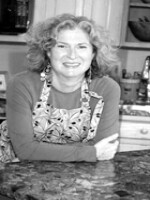ANDREA SEABROOK, host:
Many of us will spend as much time in the kitchen as in the office between now and New Year's - steaming figgy pudding, roasting chestnuts by an open fire. Okay, maybe just microwaving water for hot chocolate. But as we do, we'll tell our children about how our mothers cooked and baked for us. Food is a great connector, as WEEKEND EDITION food commentator Bonnie Wolf has been hearing from people she's met on her recent book tour.
BONNIE WOLF: It's primal. Foods evoke incredibly strong memories and feelings, and never more so than at the holidays. If your parents served roast goose or Yorkshire pudding at Christmas, you probably will too. Ditto: potato latkes and briquette for Hanukah. Food imprinting is strong. A woman in Baltimore told me her husband still makes his grandfather's brown bread in tin cans, just like his grandfather did.
Sometimes we repeat family food patterns and don't even know why. In Chicago, Debbie said her friend always cuts one end off a roast before cooking because that's what her mother did. Her mother did it that way because her mother did. So one day she asked her grandmother why she cut the end off and her grandmother replied, because it wouldn't fit in the pan.
Food binds families together, keeps generations connected and creates community. And the foods we remember are a big part of our identity. They tell us who we are and where we came from.
Tom grew up in western Pennsylvania with a grandfather who smoked his own sausage and a great grandmother who was never out of an apron and made pies he still longs for after 50 years. He says nothing makes him feel better than running into someone who shares his memories of blackberry stew with dumplings and string beans with ham.
We cook and eat to connect with family and friends, to mark the seasons and celebrate important events. And as we all know, we cook and eat for comfort.
Debbie is a hospice nurse. She once volunteered at a home hospice where cooking family-style meals for patients was central to their care. Families and patients wandered in and out of the kitchen telling stories and offering recipes. Sometimes they cried. Sometimes they laughed.
One patient who had little time left had one request. He couldn't eat but he wanted liver and onions one more time. So they fried up a big pan-full, put it on a plate and set in front of him to see and smell. They even cut up a tiny piece to put on his tongue. Debbie said his smile, as he closed his eyes and savored the smell and taste, is one of her fondest memories, because on a holiday, or any day, food is a simple act of love and connections.
SEABROOK: Bonnie Wolf contributes to NPR's online food column, Kitchen Window. She's the author of "Talking With My Mouth Full." Transcript provided by NPR, Copyright NPR.


